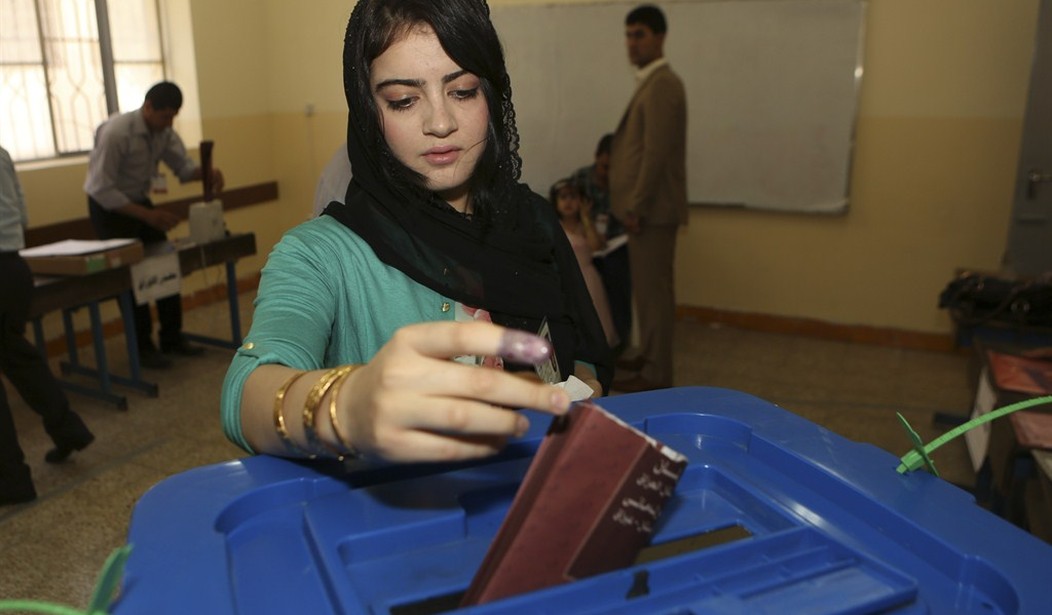In 2000, at the dawn of the 21st Century, under Saddam Hussein and his Baath Party, Iraq was suffering under the worst of the egregious misconceptions of the 20th Century. Saddam was basically a 1930s style Fascist dictator in the mold of Hitler and Mussolini, or Tojo in Japan. His Baath Party represented all of the economic fallacies and chaos of 20th Century Third World Socialism.
This was imposed on top of a society which, despite centuries of cultural vibrancy, was still mired in sectarian hatreds and even violence dating back to medieval times. Western liberal concepts such as democracy, the rule of law, and freedom of speech, religion and the press, were sometimes respected rhetorically, but were not rooted in the culture.
When the United States removed Saddam and the Baath Party by force, the American regency was happy to just find some nationals that were at least willing to go through the motions of democracy. There was no indigenous George Washington available. In current Iraqi Prime Minister Nouri-al-Maliki, the country stumbled upon an analogue to America’s retrogressive President John Adams (who became more committed to his own power than to western liberal freedom and democracy, creating an early Constitutional crisis even in the beginning years of the United States).
But in a multi-candidate field for Prime Minister in elections to be held in April, an Iraqi Thomas Jefferson may be on the horizon in the person of businessman Fadhel Al Dabbas. As Chairman of Dabbas International Group, an international trading company, Dabbas has made a highly successful career steeped in modern western culture and economics. His business ventures include The United Bank for Investment in Baghdad, where he has personally participated in world finance. His far flung business network, encompassing 13 separate businesses owned and operated by his holding company, has provided him with modern executive experience valuable for the extensive management duties of Prime Minister.
Recommended
Dabbas is campaigning on a detailed Political Program circulated in the name of the The Iraq Coalition. While Maliki has planted himself as a partisan of the Shiite majority, further fueling centuries old sectarian strife with Sunni rivals, The Iraq Coalition promoted by Dabbas is centered on a secular, non-sectarian platform that would separate religion from state, and the political authority from the religious authority, promising equal rights for all regardless of religious, ethnic or political affiliations. Indeed, the platform promotes religious freedom, by promising to get politics out of religion, an early American concept.
Dabbas would also further reduce sectarian and ethnic strife through administrative decentralization for all of Iraq, preserving more regional and localized cultural and linguistic rights. This embraces the American concept of federalism and state’s rights, which even America’s Democrat Party has a hard time understanding, especially President Obama. He would promote the rule of law by completing the establishment of the Iraq Supreme Court, never finished by Maliki as required by the Iraqi Constitution.
Also central to the Dabbas campaign is a program to promote “the fastest possible” national economic growth and prosperity for all, “by empowering the market.” While Iraq is rich in natural resources, that has not devolved to the full benefit of the Iraqi people, who suffer from a poverty rate of 28%, as estimated by the World Bank. Ali Shir, a member of the Human Rights Committee in Parliament, reports that “thousands of families live in landfills and slums.” In Sadr City neighborhoods within the capitol of Baghdad, residents suffer without water or electricity, huddling in makeshift shanties, with no paved roads.
The Dabbas program promises to maximize natural resource development (which may be instructive for the Obama Administration), but pledges to diversify growth beyond overdependence on oil production. That would involve promoting greater economic growth in agricultural and livestock production, industrial production, including local, traditional handicrafts, and tourism, a vast opportunity in a country with such a deep, historical heritage.
The Dabbas campaign offers overtones of Kennedy and Reagan in promising to combat unemployment and poverty (in particular by passing long debated modernization of social security programs), restructure the economy to curtail the hegemony of the public sector, ensure transparent and effective management of the state’s financial resources, and liberate the civil banking sector. In an interview for this article, Dabbas said, “If I’m elected, I forsee a bright future for Iraq of booming economic growth and prosperity for all based on my policies of liberating the productive capabilities of the Iraqi people.”
There are even overtones of Obama in Dabbas promises to speed up the reconstruction of the country’s infrastructure involving modernization projects for water, electricity, housing, roads, bridges, and transportation, and for fair distribution of resources to bridge the gaps between the rich minority and the poor majority. Dabbas would further promote economic growth through respect for human rights and equality for women to participate in economic and public life without restriction.
But any such economic progress would be threatened by the increased sectarian strife and violence roiled by Maliki’s Shiite dominance of the Sunnis. That has led to the resurgence of Al Qaeda in Fallujah and Ramadi, which American troops fought so hard to liberate from such influence. A thousand innocent Iraqis are now killed every month by such sectarian violence. Dabbas said, “If the United States does not act, and act fast, within the next couple of years it is going to lose all its influence over a nation it sacrificed so many American lives to free.”
In foreign policy, the Dabbas platform pledges to secure Iraqi sovereignty, free from any external intervention of foreign powers, unlike Maliki, who has surrendered to Iranian dominance. Maliki has acquiesced to military overflights supporting Assad in the Syrian civil war, and other Iranian operations on Iraqi soil to support Hezbollah in Lebanon threatening Israel. Dabbas said, “The United States has no influence over Maliki or his government. Maliki gets his orders from Iran and no one else.” Dabbas would maintain neutral, open relations with all neighbors, including Saudi Arabia, which has not been favored by Maliki, with his close Iranian ties. Dabbas adds, "I’m capable of establishing balanced, neutral relations with all neighboring countries and terminating Maliki’s alliance with Iran."
Critically, Dabbas has the resources to run a spirited, modernizing campaign for Prime Minister. That is reflected in establishment of The Iraq Coalition, and the Iraqi National Movement, which seeks to establish a “National Action Charter,” opening the government to all citizens, regardless of religion, sect, race, sex, or ideology. Dabbas has also established the Iraq Youth Center for Political Empowerment, which focuses on education of the young with modern, secular attitudes of equal rights for all, promoting for the future a more democratic, peaceful and economically stable way of life. These are critical nation building functions.
Perhaps Iraq has found its George Washington after all.

























Join the conversation as a VIP Member